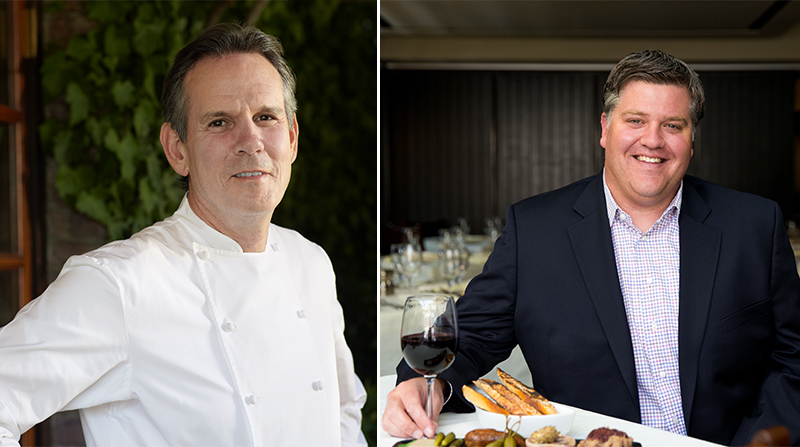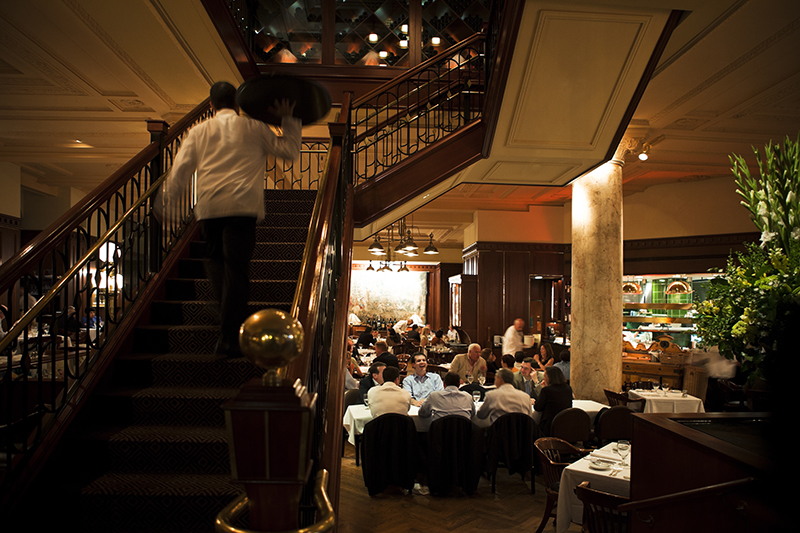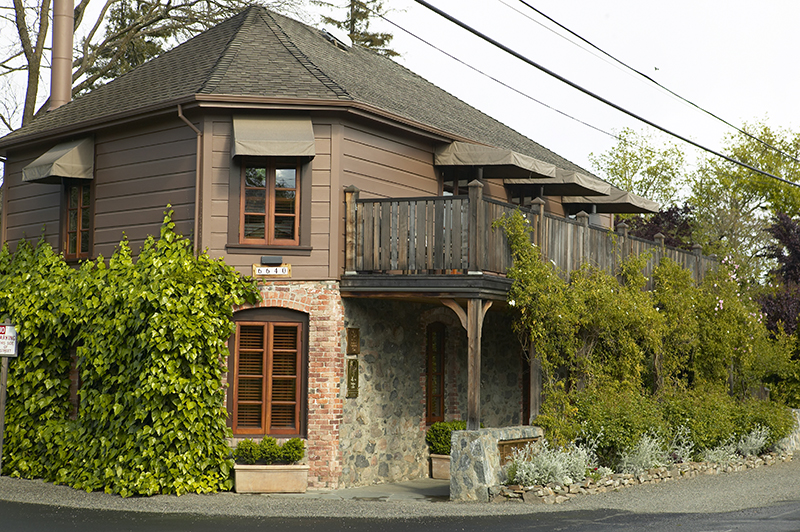

Thomas Keller and Chris Himmel. Credit: Thomas Keller and Grill 23 & Bar
Boston restaurateur Chris Himmel, along with his real-estate-developer father Ken, owns and runs a lineup of successful local eateries, including Grill 23 & Bar, Post 390 and Harvest.
Chris Himmel’s success not only comes from his ability to cook up premium steaks, but by also keeping his staff engaged with unique activities outside of the kitchen. For example, he takes his team on epic road trips to visit food purveyors, farmers, fishermen, ranchers, brewers, distillers and winemakers across the country. In 2016, he rented an RV and had various members of his restaurants fly in and out of destinations along a southern route from Boston to California, cooking, eating and exploring along the way.
This past summer, he started his now-annual road trip in Washington state and then traveled to Oregon and California, where some of the Grill 23 team caught up with renowned Forbes Travel Guide Five-Star The French Laundry chef Thomas Keller, who works with Ken on various projects.
Flying your entire staff across the country for a foodie road trip may sound extreme, but the yearly ritual exemplifies Himmel’s deep commitment to broadening his team’s connection to the people and places that provide him products.
To sprinkle even more details on Chris’ passion project and his own culinary philosophies, chef Keller sat down with us for a chat.

Grill 23 & Bar. Credit: Grill 23 & Bar
What did you think of this ambitious trip?
We were so pleased to welcome Chris Himmel to Napa Valley. Chris’ cross-country culinary road trips generate inspiration and excitement for his team. He talked about the importance of not only sourcing the finest ingredients for his restaurants but also getting to know where the ingredients come from. I couldn’t agree more.
Meeting with farmers, fishermen, foragers and ranchers to better understand how they source their products translates to awareness. I have maintained that the act of cooking is a simple equation: ingredients plus execution. Execution will always be in the hands of the chef and represents many elements — knowledge, training, experience, skill, tools — that contribute to the cuisine we serve. But ingredients are as equally important. When ingredients arrive at the restaurant they are, in one sense, already finished.
At the stove, we have no control over how an animal was raised or the way a peach was harvested. As chefs, all we can do is to carefully select our suppliers and then work with them to ensure we get the best possible ingredients.
Developing relationships is a fundamental part of any great chef’s work and recognizing that our accomplishments have been made possible through partnerships with extraordinary purveyors. Our responsibility as chefs, then, is to support these individuals by executing dishes for your enjoyment that highlight and elevate the fruits of their labors.
https://www.instagram.com/p/BMaMR6lDRgE/?taken-by=chefthomaskeller
Why is important for chefs and restaurateurs to do something like this?
It’s important for chefs and proprietors to remain curious and explore whenever possible. Whenever we step out of our regular homes and communities and lives to travel, we learn.
The experiences I have had around the country and around the world — from walking down the streets of New York City as a young cook, peering into the windows of great restaurants, to sitting down for a home-cooked meal in a warm home in the countryside of Lyon, France — have shaped me and the food I cook.
There is much to learn from adventuring outside of our routine, and it’s something I encourage throughout our restaurant group. Teams from fine dining, casual dining and our bakeries venture out in their region to meet dairy producers, cheese mongers, ranchers, chocolatiers — all these experiences broaden our perspectives and I would argue make us better to explore new relationships with those with whom we rely to make our business run.
They return with a fresh perspective on sourcing ingredients and will pass along their knowledge to our guests.
When you see things happening around your community, you have to applaud the efforts that they’re making. Of course, what that does for us, as chefs, it gives us a better product to work with. If you have a better product, your guests are walking away with a better experience.
You’ve had a successful and long-term working relationship with Ken Himmel. Are there common philosophies you share in running your restaurant organizations?
I certainly have and am very grateful for my professional relationship and friendship with Ken. I’d like to think we share a similar lens when it comes to committing to excellence. We share a dedication for being involved in every detail of a project.
Great restaurants, after all, aren’t just about great cooking. The best of them have distinctive aesthetics, vivid personalities that make themselves apparent not only in the composition of the menu, but in every detail and a special gift for collaboration.
We also understand that experiences are the most valuable commodity we have. Whatever it is, dining and beyond, if you walk away with a memory, then that’s priceless.
I’d like to think we also share a value for the concept of evolution. Ideas, projects, passions, businesses, they evolve over time. And if we let them, if we believe in them and invest the time and energy, they evolve for the better.
We are partnering again with Hudson Yards [a mixed-use development] in New York City and have engaged a larger audience in a meaningful and exciting conversation about food through a new theme. Ken’s developments have had a profound impact on their surrounding environments and I’m lucky to be part of that transformation.

